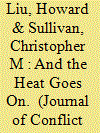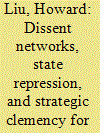| Srl | Item |
| 1 |
ID:
181860


|
|
|
|
|
| Summary/Abstract |
Among security institutions, police occupy a unique position. In addition to specializing in the repression of dissent, police monitor society and enforce order. Yet within research studying state repression, how police institutions are used and deployed to control domestic threats remain under-explored, particularly as it relates to the dual functionality just described. In this study, we develop and test an explanation of police repression accounting for the bifurcation of Mann’s two modalities of state power: infrastructural power and despotic power. Infrastructural power allocates police resources to surveil dissidents and preemptively limit dissent’s emergence or escalation. Police deploy despotic power through repressive responses to political threats. Empirically, we employ unique data to investigate police repression and the modalities of power in Guatemala. To analyze how shifting the balance between infrastructural and despotic power affects police repression, we isolate damage occurring from an earthquake that exogenously reshaped the landscape of infrastructural power. Results affirm the role of infrastructural power in regulating the despotic power of the state. Where local infrastructure was most affected by the earthquake, the security apparatus lost the capacity to surveil nascent movements and predict their activity, thereby providing opportunity for dissidents to mobilize and forcing police to (over-)react rather than shutdown resistance preemptively. However, the intensity of state violence recedes as the state recovers from the infrastructural damage and regains its control of local district.
|
|
|
|
|
|
|
|
|
|
|
|
|
|
|
|
| 2 |
ID:
186812


|
|
|
|
|
| Summary/Abstract |
Why do governments severely punish some dissidents while showing mercy to others? This study argues that when constrained by limited information on dissent, states have incentives to cast the net of repression wider by executing not just key dissent actors but also members closely connected to them to ensure demobilization. States also crave information, and granting clemency to defectors who bring in information improves state intelligence. Given that tips have different values, regimes will grant clemency to defectors who are closely connected to key dissent actors and possess high-value tips, allowing the state to pursue top fugitives and dissolve resistance more efficiently. Using newly declassified data on political victims during Taiwan’s White Terror authoritarian period, I find that the regime tends to execute both key actors (i.e., leaders and recruiters) and their closely connected members. Defectors who share information tend to receive mercy, but defectors closely connected to key actors are much less likely to face execution than less connected defectors. These findings shed new insight into the toolkit dictators use to gather intelligence on dissent and how strategic clemency induces defection and betrayal among dissidents, helping destroy dissent networks from within.
|
|
|
|
|
|
|
|
|
|
|
|
|
|
|
|